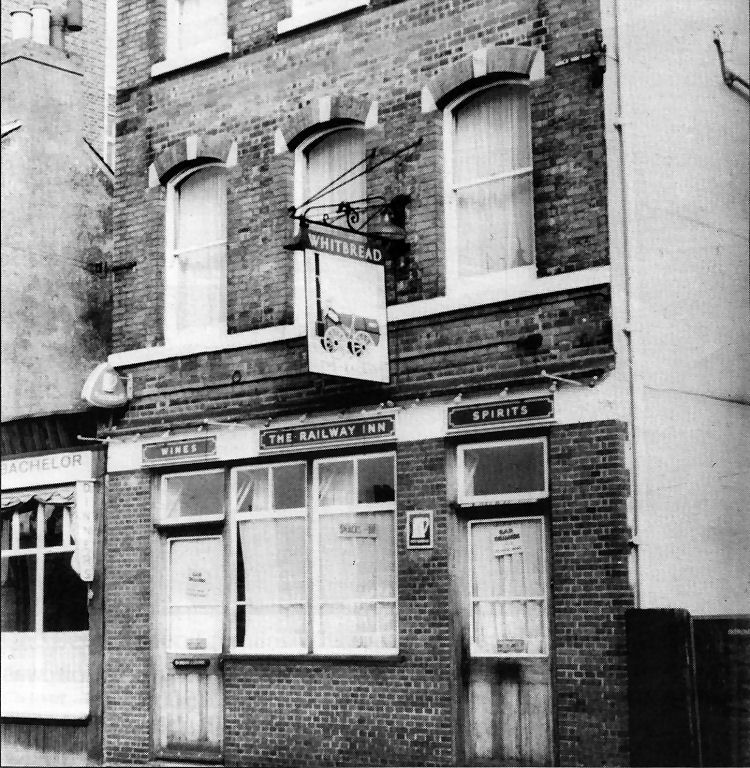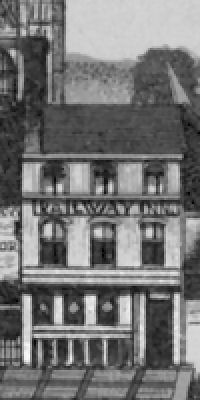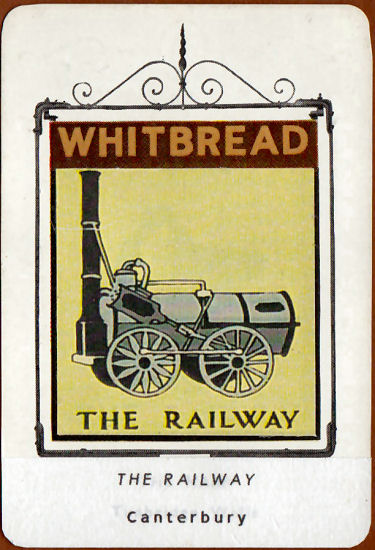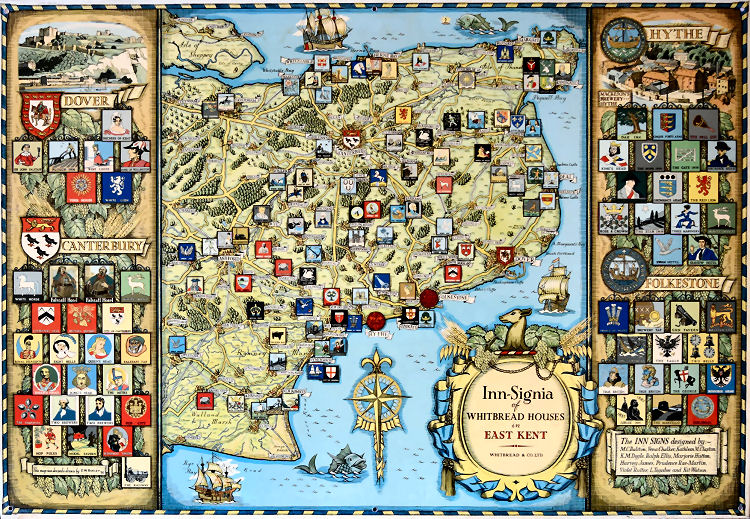|
12 (20 in 1901) Station Road West
Canterbury

Above photograph taken by Edward Wilmot in 1965. |

Above picture taken from the Historic Canterbury web site. |

The above sign, wasn't actually designed and released by Whitbread, but has
been designed by Robert Greenham in the same style as the card sets they
distributed as a representation of what the sign looked like. Robert
says:- This was based on the image which appeared on Whitbread's metal
map for East Kent which was painted by D. W. Burley in 1950, on
commission from Whitbread. |

The above metal map, kindly sent by Robert Greenham was released, in
1950 and painted by D. W. Burley, and was titled Inn-Signia of Whitbread
Houses in East Kent, Whitbread & Co Ltd. The Inn Signs designed by:- M.
C. Balston, Vena Chalker, Kathleen M Claxton, K. M. Doyle, Ralph Ellis,
Marjorie Hutton, Harvey James, Prudence Rae-Martin, Violet Rutter, L.
Toynbee and Kit Watson. |
Dating back to 1866 when Robert Cole was in charge, but changed name in
1983 to the "Old Locomotive."
Further research discovered it was licensed as early as 1867.
|
From the Whitstable Times and Herne Bay Herald. 14 September 1867. Price 1d.
ANNUAL LICENSING DAY.
New licenses were granted to the following houses:— "Railway Tavern,"
Station-road. |
|
From the Whitstable Times and Herne Bay Herald. 21 December 1867. Price 1d.
COMPLAINT AGAINST A LANDLORD OF A PUBLIC HOUSE.
Robert Coles, landlord of the “Railway Inn,” Station Road, was summoned for
keeping open his house for the sale of beer during prohibited hours, on
Sunday. P.S. Hayward deposed that a man named Herring, a fly driver, put down a
person at defendant's house, at about half-past ten on the morning of Sunday
last. He afterwards went in the house, and found them drinking together. The
person who got out of the fly was an inhabitant of Canterbury. In defence, Coles said that the person alluded to was a traveller; but
admitted giving Herring a glass of rum. Herring having corroborated this the Magistrates dismissed the case. |
|
From the Whitstable Times, 6 August, 1870.
A PREMATURE BIRTH.
On Sunday morning last on the arrival of the excursion train, a lady was
observed to get into the buss in a very faint and helpless condition.
The buss had not proceeded far before it was discovered by the ladies
inside that she was suffering from the pains of labour. The driver of
the buss was therefore instructed to drive to the nearest Inn, and she
was accordingly conveyed to the “Railway Inn,” Mr. Hilder, surgeon,
being immediately sent for and promptly in attendance. The lady was
shortly afterwards delivered of a fine boy. Both mother and child are
doing well.
|
|
Dover Express 01 January 1875.
CANTERBURY. FATAL ACCIDENT,
An inquest was held at the "Railway Tavern," Station-road,
on the body of Stephen Henry Moyes, 25 years of age, who met his death
by being run over by a railway train at Canterbury, on Monday last. Mr.
T. T. Delasaux, coroner, conducted the inquiry.
The jury having
proceeded to view the body which was lying in an outbuilding at the
railway station, Inspector Thomas Andrews stated that he knew the
deceased, and that he was a butcher and lived at Sturry.
Joseph Dowsett,
a railway porter living at Canterbury, employed at the South-Eastern
Railway, said that at about fire minutes to ten, on Monday night he was
on the platform of the South-Eastern station, and the man Saunders came
up to him and asked when the train was going. Saunders and the deceased
were wrestling in a friendly way. As they were wrestling about on the
down platform the man Saunders fell first on the line and the deceased
man fell over him.
The train was approaching at that time. Witness
jumped down on to the line, to try and pull the man Saunders from off
the line, but he had only time to touch him on the head, as the engine
was so close upon them. Two wheels of the engine, however, went over the
head of the deceased.
Witness then got under the engine and endeavoured to extricate the
deceased, but could not do so as a copper pipe was in the way. The
porters then uncoupled the engine, and they got the body of the deceased into the
six-foot way. He believed that the deceased was quite
dead. Witness believed it to be purely an accident, and no blame
attached to anyone except to the parties themselves.
It was quite
impossible for the driver of the engine to have pulled up in time to
have prevented the accident. In reply to a juror the witness said that
he tried to extricate the man Saunders, because he did not see the
deceased. There was, he said, a good gas light on at the time.
The man
Saunders was rather fresh at the time, and had quite enough to
drink.
John Ottaway, an inspector on the South Eastern Railway at
Canterbury, corroborated the evidence of the witness Dowsett, except
that he believed that the occurrence took place at 10.17 in the evening
in question. This witness also deposed to sending for the doctor and for the
police, and saw the body off the deceased removed to the stable where
it then lay. Mr. Holttum and Mr. Wacher,
surgeons, were called to the deceased, but the body was so frightfully
crushed that assistance was of no avail, the head of the deceased being
almost severed
in two.
The Coroner, in addressing the Jury, said
that no blame whatever could attach to the South Eastern Railway
Company, and that the unhappy occurrence was the fault of the deceased
man and of his companion
alone.
The Jury returned a verdict in accordance with the evidence, and also found that no blame could be attached to the railway company or any
of its servants. The Jury also unanimously ware of opinion that they
could not but approve of the conduct of the porter Dowsett, in so
gallantly exposing his own life while attempting to render assistance
to the deceased.
|
|
From the Whitstable Times and Herne Bay Herald, Saturday 13 September 1879.
Deliberate and Shocking Suicide on the South Eastern Railway.
On Friday last, shortly before noon, Henry Rickwood, aged twenty-four,
who had been in the employ of the South Eastern Railway Company for
about twelve months as temporary porter, committed suicide in the most
deliberate manner by throwing himself in front of an approaching train.
It appears that on Friday morning the station master (Mr. Fright) had
occasion to complain to the deceased in reference to the state of the
carriages on the Whitstable branch line, and Rickwood did not appear to
like being spoken to on the matter. The same morning as the 11.54 as the
fast train from Canterbury was nearing the distant signal, about
opposite the Swimming Bath in the Whitehall-road, the engine driver saw
a man take a few hasty steps across the line, then come to a dead stand,
and deliberately threw himself across the rails. The driver instantly
shut off steam, reversed the engine, and stopped the train a few yards
from the spot. The whole train, consisting of fifteen carriages besides
the engine and tender, had passed over the deceased’s body, which was
almost cut in two. One foot was severed at the ankle, the right hand was
smashed, and there was a severe wound on the left temple. The inquest on
the body was held in the evening by the coroner, T. T. Delasaux, Esq.,
at the "Railway Tavern," Station Road.
The following evidence was taken:—
Thomas Davey, dairy-man, deposed:— I
knew the deceased and had done so for about twenty years. I saw him and
spoke to him about a week ago when he was well and hearty. To-day at
about 12 o’clock I was in my garden near the South Eastern Railway. A
whistle from an engine attracted my attention. I ran to the line and saw
the deceased lying across the rails of the up the guard said he could
not leave, but sent for the head porter at the Canterbury station. The
deceased had suffered severe injuries, the right hand being smashed. His
left foot was cut off and he had a very bad injury just below the
stomach. The injuries were inflicted by the near wheels of the engine
and carriages of a train passing over him.
Mr. G. Fright, station master, deposed:— The deceased was and had been
for about twelve months a temporary porter on the South Eastern Railway.
I saw him this morning about ten o’clock at the station, and had reason
to complain to him of his neglect in allowing the carriages of the
Whitstable line to be dirty. I said I must have the carriages better
attended to, and added “if you cannot do it somebody else must.” He
replied “I have done all I can to them.” I did not observe that my
remarks and affected him in the least. For the last three weeks he has
been rather dilatory, but not more than other men.
Samuel Standing, engine driver, deposed:- This morning I was driving an
engine on the South Eastern Railway. I left the Canterbury station at
five minutes to twelve o’clock having in charge an engine, tender, and
fifteen carriages. I proceeded towards Chartham, and when I arrived
about opposite the down distance signal I saw a man come out of the
hedge with a hasty step. He stopped before he got on the line, and I saw
him throw himself down on the metals. I shut off steam, reversed the
engine, and stopped the train as soon as I could. I went to the body and
I have no doubt it was that of the man I saw throw himself on the rails.
I believe that the deceased intentionally placed himself on the line.
There is no crossing where the deceased got on the metals.
The Jury returned a verdict to the effect that the deceased committed
suicide while in a state of temporary insanity.
The funeral took place at St. Gregory’s Church on Sunday afternoon, the
body being borne to the grave by some of the porters from the South
Eastern station.
Rickwood, who leaves a wife to whom he had only been married about ten
months, was a corporal in the Army Reserve, having previously served in
the 23rd Royal Welsh Fusiliers.
|
|
From the Whitstable Times, 25 May, 1901.
OLD MAN’S DEATH ACCELERATED BY A FALL.
The City Coroner (Dr. T. S. Johnson) held an inquest at the "Railway
Hotel," South Eastern Road, Canterbury, last Wednesday evening, touching
the death of Samuel Bunyard, aged 78, living at 6, Kirby’s Lane.
It appeared that the deceased was a pensioner in the Royal Navy. About
eighteen months ago he was knocked down by a carriage while crossing the
road and he had been failing ever since. On May 4th he fell over a
chair. Mr. Greasley was called in, but the deceased died on Monday
morning. The doctor, who had known the deceased for ten or twelve years,
saw him two days after the accident. He found no bruises on the
deceased, but he got weaker and weaker. Death was due to senile debility
accelerated by the accident.
The jury returned a verdict of Accidental Death.
|
Licensee George Pope later became the Mayor of Canterbury in 1924-26.
The Inns of Canterbury by Edward Wilmot's,1988, mentions a document, date
circa 1945 that gives the description of clientele at the pub as being "Residents,
rail and bus travellers."
The building was demolished in a gas explosion on August 2002 and is now
a block of flats.
|
From an email received 16 June 2012
During the 60s and 70s, the Landlord was
Vic Hollingsworth. His wife, Ursula, was a native of Hamburg. My Dad was
a member of the Railway Darts Team in the 1970s, a good team which
narrowly escaped taking a title on several occasions. Vic was a cigar
smoker (sizeable cigars) and he had an enormous cigar, about two feet
long, mounted in a case on the wall behind the bar, promising that he'd
smoke it the day his Team won the Canterbury Darts League title. It
remained unsmoked.
Stuart Eaton. |
LICENSEE LIST
COLE Robert 1867-82+ (widower age 42 in 1881 ) )
   
POPE George 1891-13+
(age 51 in 1911 ) )
     
WINKLE Sidney 1922-30+
 
GRAY Mrs Jessie 1938+

HOLLINGSWORTH Vic 1960s-70s+
https://pubwiki.co.uk/RailwayInn.shtml
 Greens
Canterbury Directory 1868 Greens
Canterbury Directory 1868
 From the Post Office Directory 1874 From the Post Office Directory 1874
 Census Census
 From the Post Office Directory 1882 From the Post Office Directory 1882
 From the Post Office Directory 1891 From the Post Office Directory 1891
 From the Post Office Directory 1903 From the Post Office Directory 1903
 From the Kelly's Directory 1903 From the Kelly's Directory 1903
 From the Post Office Directory 1913 From the Post Office Directory 1913
 From the Post Office Directory 1922 From the Post Office Directory 1922
 From the Post Office Directory 1930 From the Post Office Directory 1930
 From the Post Office Directory 1938 From the Post Office Directory 1938
 Inns of Canterbury
by Edward Wilmot, 1988 Inns of Canterbury
by Edward Wilmot, 1988
 Historic
Canterbury web site www.machadoink.com Historic
Canterbury web site www.machadoink.com
 Whitstable
Times and Herne Bay Herald Whitstable
Times and Herne Bay Herald
|



